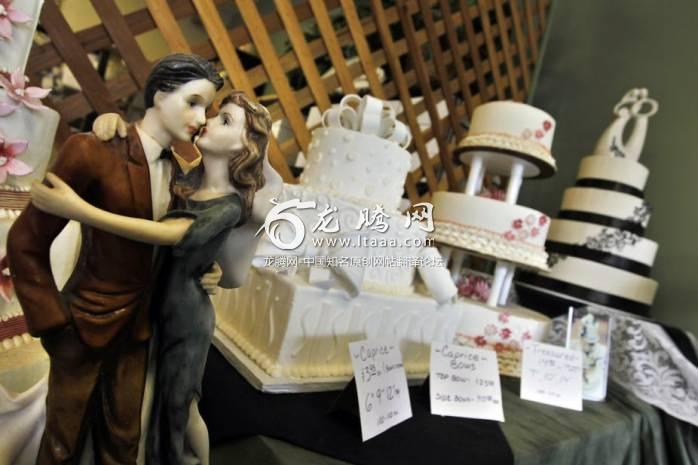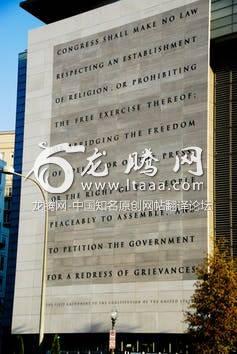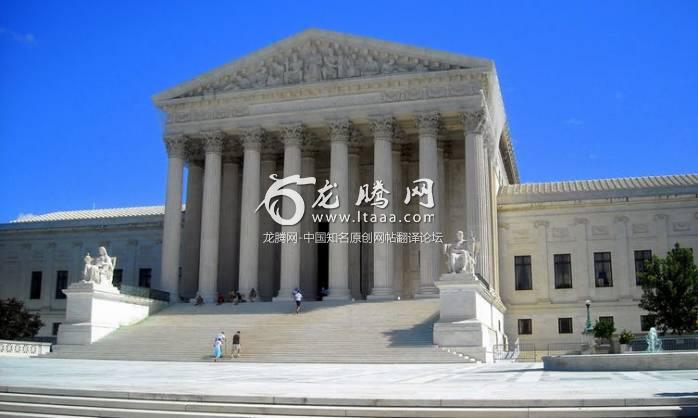混乱不堪的美国宗教自由现状 [美国媒体]
12月5日周二,在审理杰作蛋糕店有限公司与科罗拉多州民权委员会对簿公堂中的口头辩论程序时,一个意见明显分裂的美国最高法院处理了这个争议性的宗教自由议题。这场争论似乎使他们均势地分裂为四位保守派法官对四位自由派法官。通常作为摇摆票的法官安东尼·肯尼迪,看起来站在面包师一边。
On Tuesday, Dec. 5, a visibly divided U.S. Supreme Court tackled the contentious issue of religious freedom when it heard oral arguments in “Masterpiece Cakeshop, Ltd. v. Colorado Civil Rights Commission.” The arguments appeared to evenly split the four conservative justices from the four liberals. Justice Anthony Kennedy, who is often a swing vote, seemed to side with the baker.
12月5日周二,在审理杰作蛋糕店有限公司与科罗拉多州民权委员会对簿公堂中的口头辩论程序时,一个意见明显分裂的美国最高法院处理了这个争议性的宗教自由议题。这场争论似乎使他们均势地分裂为四位保守派法官对四位自由派法官。通常作为摇摆票的法官安东尼·肯尼迪,看起来站在面包师一边。
The case involves a Denver bakery owner who refused to make a wedding cake for a gay couple, citing his religious belief that marriage can be between only a man and woman. The couple sued, and a lower court ruled the baker violated Colorado’s public accommodations law. The statute forbids discrimination by businesses serving the public, including on the basis of sexual orientation.
该案件涉及到一位丹佛的面包房店主拒绝为一对男同夫妇制作婚礼蛋糕,并援引他的宗教信仰认为婚姻只能发生在一男一女之间。这对夫妇就此去起诉,下级法院裁决该面包师触犯了科罗拉多州的公共场所法。该法规禁止服务于公众企业的歧视行为,包括那些基于性取向的歧视。
(译注:丹佛是美国科罗拉多州的一个合并市县,是该州最大的城市兼首府)
In their appeal to the Supreme Court, the bakery’s lawyers have emphasized free speech issues by presenting the baker as an artist who has a right to choose how he expresses himself. But religious freedom remains central to the case. A key question is whether a business owner must provide services that conflict with his or her religious beliefs.
在他们向最高法院的上诉中,面包房的律师们已指出作为一个艺术家的面包师(译注:其店名意为“大师杰作”)拥有选择如何表达自我的权利,以此强调了言论自由问题。但宗教自由仍居于案件的核心。关键问题是:一个企业主是否必须提供与他或她的宗教信仰冲突的服务。
This divisive case highlights the vast difference between the reality and the rhetoric of religious freedom, which is often considered to be the ideal that promotes harmony and equality. But, history suggests that it does lead to more conflict.
这个分歧巨大的案件突出了现实和宗教自由说辞之间的天壤之别,而宗教自由往往被看成是促进和谐平等的典范。但历史表明它确实会导致更多的冲突。
The rhetoric: Equality and goodwill
关于平等和善意的说辞
It is true that throughout U.S. history, Americans have idealized religious freedom and imagined that it brings harmony.
确实在美国历史中随处可见美国人对宗教自由的理想化并想象其能带来和谐。
Text of the First Amendment.
第一修正案的文本
The First Amendment’s clauses guaranteeing religious free exercise and preventing establishment of an official church seemed to promise less discord to the Founding Fathers. In an 1802 letter, Thomas Jefferson, for example, wrote that “religion is a matter which lies solely between Man & his God.” As the nation’s third president, he argued that a “wall of separation between Church & State” would give all people equally the right to free conscience.
第一修正案的条款保证了宗教自由的行使且防止了国教的建立,看上去减少了国父间的不和。就比如,在一封1802年的信中,托马斯·杰弗逊写道,“宗教是只限于一个人与他的上帝之间的问题”。身为这个国家第三任总统,他辩称“一道隔断教会与国家的墙”能平等地给予所有人民良心自由的权利。
Later presidents echoed the view that religious freedom brings equality and unity by preventing government from favoring particular faiths.
之后的总统附和了这种认为宗教自由通过防止政府偏私特定信仰带来平等和团结的观点。
Before his election in 1960, John F. Kennedy tried to ease fears about his Catholicism by affirming religious liberty. Kennedy believed this freedom kept one group from oppressing another. It formed the basis of a society, he declared, where people would “refrain from those attitudes of disdain and division which have so often marred their works in the past, and promote instead the American ideal of brotherhood.”
约翰·费茨杰拉德·肯尼迪在他1960年的大选之前,尝试通过确认宗教自由来减缓人们对他信奉天主教的恐慌。肯尼迪相信这种自由能阻止某群体压迫其他群体。它构成了社会的基础,他宣称在这样的社会里人民能“避免那些在过去常玷污他们工作的鄙夷和分裂的态度,并且能促进美国人理想中的手足情谊..”
In the early 1990s, George H.W. Bush identified religious liberty as the basis for other rights. He credited it as a major reason for the vibrancy of American society.
在1990年代早期,乔治·赫伯特·沃克·布什(即老布什)把宗教自由确定为其他权利的基础。他把美国社会大有活力的主要原因归功于它。
The reality: Conflict and debate
现状:冲突和争论
But, the promised harmony has proved elusive. Scholars such as Steven K. Green and Tisa Wenger have documented arguments about religious freedom throughout U.S. history.
但是,说好的和谐被证明为遥不可及。Steven K. Green和Tisa Wenger这样的学者曾就贯穿整个美国历史的宗教自由提供过论证文献。
Minority communities, ranging from Catholics to Mormons, have fought to have their traditions and customs recognized as religious. As I show in my work on pluralism, Americans have debated what constitutes a religious expression rather than a cultural practice. People have also argued whether religious expression can extend into political, social and business interactions.
从天主教徒到摩门教徒的少数群体已为他们的传统和习俗被承认为宗教而奋斗。如同我在致力于多元主义的工作中展现的那样,美国人对于是什么构成了宗教表达而不是文化习俗展开过辩论。人们也争论过宗教表达能不能延伸到政治、社会和商业互动中去?
These debates have required the intervention of the courts and have often ended at the Supreme Court. Thus, a right intended to free Americans from government has instead necessitated frequent involvement of a major government institution.
这些争论需要法庭的介入,经常以对簿最高法院告终。因此,一项本意是让美国人摆脱政府的权利,却反而让一个主要的政府机构频频涉入成为必要。
Further complicating matters, the Supreme Court has changed its position over time. Its evolving interpretations show how religious freedom debates create shifting categories of winners and losers.
更复杂的问题是,随着时间推移最高法院在不断改变自己的立场。其不断演进的解释向我们展示了对宗教自由的争论是如何产生不停换位的赢家和输家的。
To the courts
对法院而言
Like Masterpiece Cakeshop, one of the Supreme Court’s first religious liberty cases involved marriage. In 1878, a Mormon resident of the Utah territory sued the federal government after he was charged with bigamy. He argued that the law violated his religious liberty by criminalizing his polygamous marriage. The Supreme Court disagreed. In Reynolds v. United States, the court ruled that the First Amendment guaranteed only freedom of belief, not freedom of practice.
和杰作蛋糕店类似,最高法院第一批受理的宗教自由案件之一也牵扯到婚姻。在1878年,一个犹他领地的摩门教定居者在他被指控重婚罪后起诉联邦政府。他辩称该法律因歧视他的一夫多妻制婚姻侵犯了他的宗教自由。而最高法院不同意。在雷诺兹诉美国案件中,法院最终裁决第一修正案保证的只是信仰的自由而非行使的自由。
(译注:Utah territory即“犹太领地(1850-1896)”,美国历史上的一个合并建制领土,为犹他州的前身)
In the 20th century, the Supreme Court showed greater sympathy to religious liberty claims. In several cases – including one brought by Jehovah’s Witnesses challenging a statute requiring a permit for public evangelizing and another by an Amish community that objected to Wisconsin’s compulsory public school law – justices sided with those who claimed their freedom was violated.
在20世纪,最高法院对宗教自由的权利要求展现了更大的支持。在若干个案件中,包括一个由耶和华见证人派提出的诉讼,挑战一项公开传道需要经过许可的法令,以及另一个由阿米什人群体提出的诉讼,反对威斯康星州强制义务教育法 - 法官们站在了那些声称他们的自由被侵犯了的人们一边。
That changed in 1990. The court ruled against two men who lost their jobs after using peyote, the cactus, which has hallucinogenic properties and has long been used in Native American religious practices. Because they were fired for drug use, the men were denied unemployment benefits. They claimed that as members of a Native American church, they used the drug for religious purposes.
那种情况在1990年改变了。法院否决了使用佩奥特掌后丢掉工作的两个男子的诉求,这是一种有致幻性能并被长期使用在美洲原住民宗教活动中的仙人掌。因为他们是因药物使用而被解雇,这俩人被拒付失业津贴。他们声称自己作为美洲原住民教会的成员,是为了宗教目的而使用药物的。
United States Supreme Court.
美国最高法院
Moving away from earlier decisions, justices ruled that religious belief was not a ground for refusing to obey laws “prohibiting conduct that the State is free to regulate.”
背离了更早年代的判决,法官们的判决为宗教信仰不能成为拒绝服从那些“不准指挥不受管控州”的法律的根据。
New century, new conflicts
新的世纪,新的冲突
The peyote case set the stage for Masterpiece Cakeshop. It was in response to the case that Congress passed the Religious Freedom Restoration Act (RFRA) of 1993. It required that laws restricting religious expression must show that they serve a compelling need.
佩奥特掌案为杰作蛋糕店做了铺垫。它是对于1993年国会通过“宗教自由恢复法(RFRA)”的回应。它要求约束宗教表达的法律必须能够证明它们服务于一种强制性的需要。
RFRA was central in the Supreme Court’s 2014 decision in Burwell v. Hobby Lobby. That contentious split ruling allowed small, closely held companies the right to deny contraceptive benefits mandated by the Affordable Care Act on the grounds of protecting their owners’ religious liberty.
RFRA在最高法院2014年对“伯韦尔诉业余爱好大堂”一案的判决中居于核心位置。那项带着争议的歧见下的裁定,允许小型私人持股公司以保护它们所有者宗教自由为理由,持有拒付平价医疗法案强制规定的避孕福利的权利。
Similarly, in October 2017, the Trump administration invoked freedom of religion when it allowed all employers a religious exemption to the contraception coverage requirement in the Affordable Care Act.
相似地在2017年10月,川普政府行使了宗教自由,允许所有雇主在平价医疗法案中要求的对避孕费用的覆盖上拥有宗教豁免。
Critics saw that policy change as an attack on women’s rights. Reaction to it on both sides again showed that government involvement in debates about religious freedom invariably produces winners and losers.
批评家们把这项政策转变看成是对妇女权利的侵袭。双方又一次对它作出反应,证明了关于宗教自由争论中政府的涉入总是制造出赢家和输家。
Given our polarized society and the division among the Supreme Court justices today, this pattern will continue, whatever the verdict is.
鉴于我们今天的而两极化社会以及最高法院里法官之间存在的分裂,无论裁决为何这种模式将会继续下去。
John M
Bake the cake, but let them put their own symbols on it. Compromise. We don’t have to agree with everything someone else does, but do we really need the government dictating who can marry who, and who can bake a cake for what people?
可以妥协一下,烘焙出蛋糕,然后允许他们做上自己的记号。我们不必同意别人做的每件事,但我们真的需要政府来指示谁能娶谁,谁能为什么人烘焙蛋糕吗?
Steve Taffee Steve Taffee is a Friend of The Conversation
We can (probably) all agree that one must not tolerate all religious practices. For example, freedom of religion is not a license to commit criminal activities. (Well, we have carved out exceptions such as the use of Peyote by the Native American Church.)
Taking religion out of the picture for the moment, what are the rights of shop owners who are asked to create symbols or words that they find offensive? If the baker was asked to create a cake in the shape of a phallus or swastika, could they decline? Who is the arbiter of the line between acceptable and unacceptable cake decorations?
This case is being cast as a religious freedom argument, but I wonder if there is also an free speech issue here. What do others think?
我们也许都能同意一个人不可以容忍所有的宗教活动。举例来说,宗教自由不是一种进行犯罪行为的执照。(好吧,我们已经刨除了美洲原住民教会使用佩奥特掌的这类例外)。
此刻先撇开宗教不谈,被要求做出会冒犯到他们的标记或言语的店主,其权利到底是什么呢?如果面包师被要求做出阳具或纳粹铁十字形状的蛋糕,他们能够拒绝吗?谁又能充当划分蛋糕装点可以接受和无法接受界限的仲裁者呢?
这个案子被归置为宗教自由的争论,但我想知道这里面如果也有潜在的言论自由议题。别人会怎么想?
Steve Coffey
Businesses that are open to the public shouldn’t be allowed to operate unless they’re willing to serve ALL the public. They shouldn’t get to pick and choose who they’ll serve and who they won’t based on something like sexual orientation. Or age. Or religious belief. Or gender. Or ethnicity.
What’s next, refuse to serve blond-haired people? People with green eyes? People with moles on their chins? People who are overweight? Where do we draw the line on “acceptable” discrimination?
No shoes, no shirt, no service: I’ve got no problem. There are legitimate reasons why those rules are enforced, but we went through this once before (more than 50 years ago) and finally managed to (start to) put an end to discrimination based on skin color by way of civil rights legislation.
Legislation on religious freedom shoudn’t be allowed to be a pretext for prejudice.
除非他们愿意服务所有的公众,不然面向公众的生意就不该被允许运作。他们不该基于类似性取向的东西去挑挑拣拣谁他们会服务而谁就不行。或者年龄。或者宗教信仰。或者性别。或者种族区划。
下一步会如何,拒绝服务金发人群?还是有绿眼睛的人?下巴上有痣的人?超重的人群?我们要把“可接受的”歧视的界线划在哪里?
不提供鞋,不提供衬衫,不提供服务:我都没问题。这些法律被执行有正当的理由,但我们在50多年前经历过一次了,终于勉强能够通过民权法案开始结束基于肤色的歧视。
针对宗教自由的法案不该被允许作为偏见的借口。
版权声明
我们致力于传递世界各地老百姓最真实、最直接、最详尽的对中国的看法
【版权与免责声明】如发现内容存在版权问题,烦请提供相关信息发邮件,
我们将及时沟通与处理。本站内容除非来源注明五毛网,否则均为网友转载,涉及言论、版权与本站无关。
本文仅代表作者观点,不代表本站立场。
本文来自网络,如有侵权及时联系本网站。
图文文章RECOMMEND
热门文章HOT NEWS
-
1
Why do most people who have a positive view of China have been to ...
- 2
- 3
- 4
- 5
- 6
- 7
- 8
- 9
- 10
推荐文章HOT NEWS
-
1
Why do most people who have a positive view of China have been to ...
- 2
- 3
- 4
- 5
- 6
- 7
- 8
- 9
- 10













